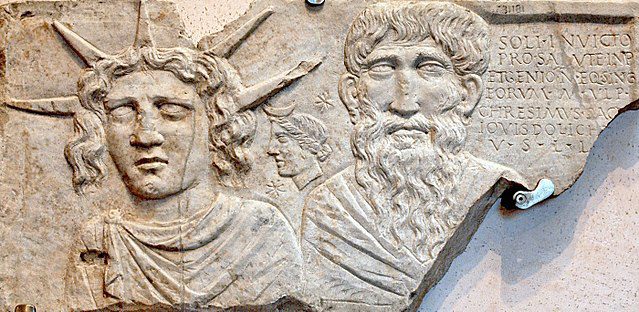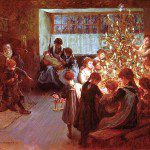
The following exchange came about in a combox on my blog, underneath the article, Christmas Trees as Idols?: Silly “Biblical” Arguments. The words of R. Green (possibly a Jehovah’s Witness: he didn’t say) will be in blue.
*****
The scriptural understanding of idolatry, especially for Jehovah’s Witnesses, goes much deeper than just ‘worshiping the tree itself as an idol’.
For a worshiper of God (as found in the Hebrew and Greek Scriptures,) the real idolatry comes from the replacing the type of worship of which God approves – again, as described in the Scriptures – with the ideas of men and demons. Jehovah’s Witnesses look to the Bible for ‘truth in worship’. The Bible does not command any such celebration as Christmas. In fact, it only offers vague clues as to the time of year that Jesus was born. God was very clear to the Israelites about days and weeks that were to be observed as ‘Holy’ (Holy Days = Holidays.) Jesus too was clear about Holy observances. He told his followers to memorialize the day he gave his life with a symbolic breaking of bread and a glass of wine. This was a command for a Holy Memorial – “Do this in memory of me.”
From this perspective therefore, anything that is instituted by man as a ‘holy day’ becomes idolatry – especially when it is derived from non-biblical religions and worship. It is well-known that Christmas was instituted by the Catholic Church as an appeasement to ‘converted Pagans’ (Pagan being a common catchall term, though not truly an accurate way to classify the many types of non-Judeo-Christian beliefs found in Europe and the surrounding areas.) The Christmas tree, as well as many other iconic representations of holiday observances, can then rightly be seen as idols. It is religious symbology brought into Christianity from these ‘Pagan’ groups by the Catholic Church.
One may choose to not view Christmas trees, mistletoe, yule logs, etc… as religious icons, but it really can’t be argued that they do not derive from idol worship.
To the contrary, the Bible gives much indication of holy days and the celebration of them. I have written about the origins of the Christmas tree custom, too. I dealt with this issue among many others, in my extensive refutation of Jehovah’s Witnesses back in 1987:
4. Holidays
Galatians 4:8-11 is interpreted by JWs as forbidding the keeping of holidays. But what Paul is really condemning here, in context, is a scrupulous observance of Jewish sacred days in order to obtain salvation. Paul instructed the Galatians to abandon legalism and to enjoy the liberty that they had in Christ (Gal 3:12).
Christmas is considered by the Watchtower to be a pagan holiday, since, they maintain, it is on the date of the old Roman feast day Saturnalia. Even beyond that,
Christmas has nothing to do with Christ. It is saturated with demonism. (WT [Watchtower], 15 December 1978, 5)
JWs have also regarded Christmas as Nimrod’s birthday. . . .
The Watchtower cites Jeremiah 10:3-4 in order to “prove” that Christians shouldn’t put up Christmas trees. In context, however (esp. 10:8, 14-15), we see that the passage has nothing to do with decorations, but rather, the making of wooden idols, the powerlessness of idols, and the sin and folly of idolatry. For the Watchtower objection to have any force, they would have to establish the fact that people in fact worship their Christmas trees (see WT, 15 December 1976, 766); clearly an absurd scenario.
Charles Taze Russell, the Founder of Jehovah’s Witnesses, thought that the celebration of Christmas was important and proper:
In Pastor Russell’s day, Christmas was celebrated at the old Bible House in Allegheny, Pennsylvania . . . the celebration of Christmas with a Christmas tree in the Bethel dining room . . . (1975 Yearbook of Jehovah’s Witnesses, 1974, 147)
Christmas was outlawed in 1928 by the Watchtower. Thanksgiving, Easter, and Good Friday are likewise forbidden, under the threat of disfellowshiping. Birthdays aren’t celebrated, since:
. . . they exalt the creature, making him the center of attention rather than the Creator. (The Truth That Leads to Eternal Life, 1968, 146)
This wasn’t always the case, either:
In those earlier days, dedicated Christians commemorated birthdays . . . birthday celebrations and Mother’s Day were discarded — more creature worship. (1975 Yearbook of Jehovah’s Witnesses, 1974, 147)
Likewise, involvement in Christian weddings, funerals, baptisms, etc. are deemed improper for the JW. Holidays in general are said to:
. . . honor and exalt nations or worldly institutions. The wrong custom here is giving credit to such organizations for benefits that really should be credited to God. (The Truth That Leads to Eternal Life, 1968, 146)
The refutation of this sort of Pharisaical legalism can be found in Holy Scripture:
Romans 14:5-6 (KJV) One man esteemeth one day above another: another esteemeth every day alike. Let every man be fully persuaded in his own mind. He that regardeth the day, regardeth it unto the Lord . . .
Christians are commanded by God to “honor” their mothers and fathers (Ephesians 6:2), widows (1 Timothy 5:3), Christian teachers (1 Timothy 5:17), wives (1 Peter 3:7), fellow Christians (1 Corinthians 12:12-26), and governing authorities (Romans 13:7, 1 Peter 2:17). A spirit of honoring those who are worthy of honor is to typify the Christian (Romans 12:10, 1 Peter 2:17).
Thank you very much for your reply. If I understood your introduction correctly, we agree on this point. Since the Bible DOES give ‘much indication’, and it DOES NOT give any description of a Christmas celebration – nor any of the commonly used symbolism surrounding such a ‘holiday’, then it becomes clear that Christmas – especially as a religious observance – comes from the mind of men (and even from the practices of demon worship.)
As for pertinent scripture used by Jehovah’s Witnesses regarding the mixing of Pagan rites, observances, and celebrations that originate – not from the Bible – but from Pagans, the most common is from 1 Cor. Chpt. 10:
1 For I do not want you to be unaware, brothers, that our fathers were all under the cloud, and all passed through the sea, 2 and all were baptized into Moses in the cloud and in the sea, 3 and all ate the same spiritual food, 4 and all drank the same spiritual drink. For they drank from the spiritual Rock that followed them, and the Rock was Christ. Nevertheless, with most of them God was not pleased, for they were overthrown in the wilderness.
6 Now these things took place as examples for us, that we might not desire evil as they did. 7 Do not be idolaters as some of them were; as it is written, “The people sat down to eat and drink and rose up to play.” 8 We must not indulge in sexual immorality as some of them did, and twenty-three thousand fell in a single day. 9 We must not put Christ to the test, as some of them did and were destroyed by serpents, 10 nor grumble, as some of them did and were destroyed by the Destroyer. 11 Now these things happened to them as an example, but they were written down for our instruction, on whom the end of the ages has come. 12 Therefore let anyone who thinks that he stands take heed lest he fall. 13 No temptation has overtaken you that is not common to man. God is faithful, and he will not let you be tempted beyond your ability, but with the temptation he will also provide the way of escape, that you may be able to endure it.
14 Therefore, my beloved, flee from idolatry. 15 I speak as to sensible people; judge for yourselves what I say. 16 The cup of blessing that we bless, is it not a participation in the blood of Christ? The bread that we break, is it not a participation in the body of Christ? 17 Because there is one bread, we who are many are one body, for we all partake of the one bread. 18 Consider the people of Israel: are not those who eat the sacrifices participants in the altar? 19 What do I imply then? That food offered to idols is anything, or that an idol is anything? 20 No, I imply that what pagans sacrifice they offer to demons and not to God. I do not want you to be participants with demons. 21 You cannot drink the cup of the Lord and the cup of demons. You cannot partake of the table of the Lord and the table of demons. 22 Shall we provoke the Lord to jealousy? Are we stronger than he?
One of the best examples referred to in that passage is taken from when Moses was on the Mountain (the first time) receiving the 10 Commandments. The Israelites had established their own ceremony to God using Pagan symbology (the Golden Calf.) God told Moses that the Israelites were sinning by ‘having turned aside quickly out of the way that I commanded them.’
During that ordeal, Aaron said… “Tomorrow shall be a feast to Jehovah.” The Tetragrammaton (God’s Name as transliterated in many Bible versions as “LORD”) is even used by him to show that the Israelites were using Pagan ways of worship, but doing so in the name of the God “who led them out of Egypt”!
This mixing of true worship with Paganism was not only declared sinful at the time by God, but also shown by Paul in 1 Corinthians to be unacceptable.
However, it’s obvious that we probably won’t agree, so I’ll just leave my case as it stands.
Where in the Bible does it say that we can only do or believe things or worship according only to what the Bible explicitly lays out? And if you can’t find that, why do you hold to the notion? Well, I’ll tell you: you do because it is a mere tradition of men.
What I argue is that there is such a thing as a holy day in the Bible, which is permissible and praiseworthy and godly. Therefore, one can celebrate such a day, even if a particular one is not expressly commanded, as long as it is not an unrighteous celebration and has been taught and commissioned by the Christian Church, established by Christ, and is completely harmonious with Scripture.
Celebrating the birth of our Lord and Savior Jesus Christ, Who is God, is certainly not idolatrous in any way, shape, or form, because it’s worshiping God and commemorating His incarnation: the very thing that makes salvation available to and possible for us.
JWs, on the other hand, blasphemously deny that Jesus is God. Now that is a terrible, damnable error indeed, because it is contrary to Christians tradition from the beginning and hundreds and hundreds of biblical proofs about the divinity of Jesus and the Holy Trinity: which matter I’ve also debated at length with a Jehovah’s Witness elder.
Worshiping a calf as God is clearly idolatry (I’ve written about it). Worshiping Jesus and His Father at Christmas is not.
You seem prepared to argue. I am not. I just made my case, cleared up any potential ambiguities, and I’ll leave it there. Have a nice day.
Being a professional apologist, that’s what I do. I defend Christianity and Catholicism in particular (and I also studied Jehovah’s Witnesses for many months in the early 80s, when I was just starting out in apologetics). You made your case, and I demonstrated, I think, that it abysmally failed, and that it is not in accord with either the Bible or historic Christianity.
You have a great day, too, and God bless you.
***
[separate sub-thread]
Perhaps the most direct scriptural evidence is that Jesus lived for about 33 1/2 years. He died in the Spring, so he was probably born in Autumn. However this too is vague, as the scriptures say ‘about’ (or approximately) when giving the length of Jesus’ ministry. Taken together with the reasoning you offered above, as well as the fairly well established historical agreement that Dec. 25th was the exact time that converted ‘Pagans’ (see my main comment) celebrated Saturnalia, the weight of evidence leans toward Dec. as not being the time of Jesus’ birth.
I’ve written about this issue twice:
Was Christ Actually Born Dec. 25?
December 25th Birth of Jesus?: Interesting Considerations
The Romans celebrated Saturnalia between December 17-23, observing the winter solstice on December 23rd.
Sol Invictus was on December 25th, but the earliest date provided by historical evidence for its celebration is 274 (institution by the Roman emperor Aurelian).
We have a record of celebrations of Christmas on December 25th, from Pope St. Telesphorus (c. 125-136), the seventh bishop of Rome, St. Theophilus (115-181), bishop of Caesarea, and St. Hippolytus (170-240).
So if anyone got a date from someone else, it was the pagan Romans borrowing from the Christians.
***
Related reading:
*
***
Photo credit: Stele Sol Invictus Terme (150-200 AD): Dedication slab representing the Sun god crowned by solar rays, the Moon goddess bearing a crescent on her hair, and an old man, perhaps Jupiter Dolichenus. From the area of the barracks of the Equites Singulares, via Tasso, Rome. Photograph by Marie-Lan Nguyen (September 2006) [public domain / Wikimedia Commons]
***













